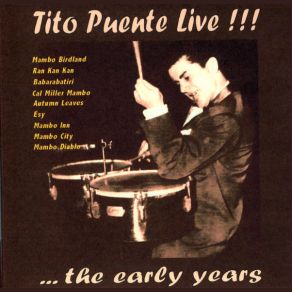Tito Puente Live…The Early Years / Tito Puente Live...The Early Years
Download links and information about Tito Puente Live…The Early Years / Tito Puente Live...The Early Years by Tito Puente. This album was released in 2007 and it belongs to Jazz, Latin genres. It contains 10 tracks with total duration of 43:59 minutes.

|
|
|---|---|
| Artist: | Tito Puente |
| Release date: | 2007 |
| Genre: | Jazz, Latin |
| Tracks: | 10 |
| Duration: | 43:59 |
| Buy it NOW at: | |
| Buy on iTunes $6.90 | |
Tracks
[Edit]| No. | Title | Length |
|---|---|---|
| 1. | Mambo Birdland | 4:23 |
| 2. | Ran Kan Kan | 6:07 |
| 3. | Babarabatiri (featuring Vicentico Valdés / Vicentico Valdes) | 6:16 |
| 4. | Cal Miller Mambo | 4:40 |
| 5. | Autumn Leaves | 3:40 |
| 6. | Esy | 6:12 |
| 7. | Mambo Inn | 3:52 |
| 8. | Mambo City | 2:49 |
| 9. | Mambo Diablo (featuring Mongo Santamaria) | 4:53 |
| 10. | Symphony Sid and Tito | 1:07 |
Details
[Edit]Simply put, this collection of early Tito Puente sides recorded in the early 1950s is a collection of previously unreleased tunes from radio broadcasts for WABC in New York City on the Birdland Show. It includes early versions of his classics such as “Ran Kan Kan,” “Mambo Birdland,” “Mambo Diablo,” “Mambo Inn,” “Mambo City,” and “Barbaratiri.” In addition, there is a wildly exotic reading of the standard “Autumn Leaves” that Les Baxter would have killed to record, but as a Latin read on American jazz, it's irresistible for its atmosphere and expansive use of harmonics. It is also notable that these sides (nearly all first recorded for Tico), despite their somewhat dodgy fidelity, do swing wildly, thanks in part to the great conguero Mongo Santamaria helping to drive Puente’s signature rhythmic approach that made Afro-Cuban music so accessible to literally millions of listeners after his jump to Columbia. The only annoyance on this set is the continuous presence of the radio announcer, who introduces every cut but two, which Puente introduces. Certainly this is for the collector, but it’s also for the more casual fan who wants to hear the very rapid development of Puente’s music in the early '50s and its adaptation to American jazz as it met Afro-Cuban dance music.